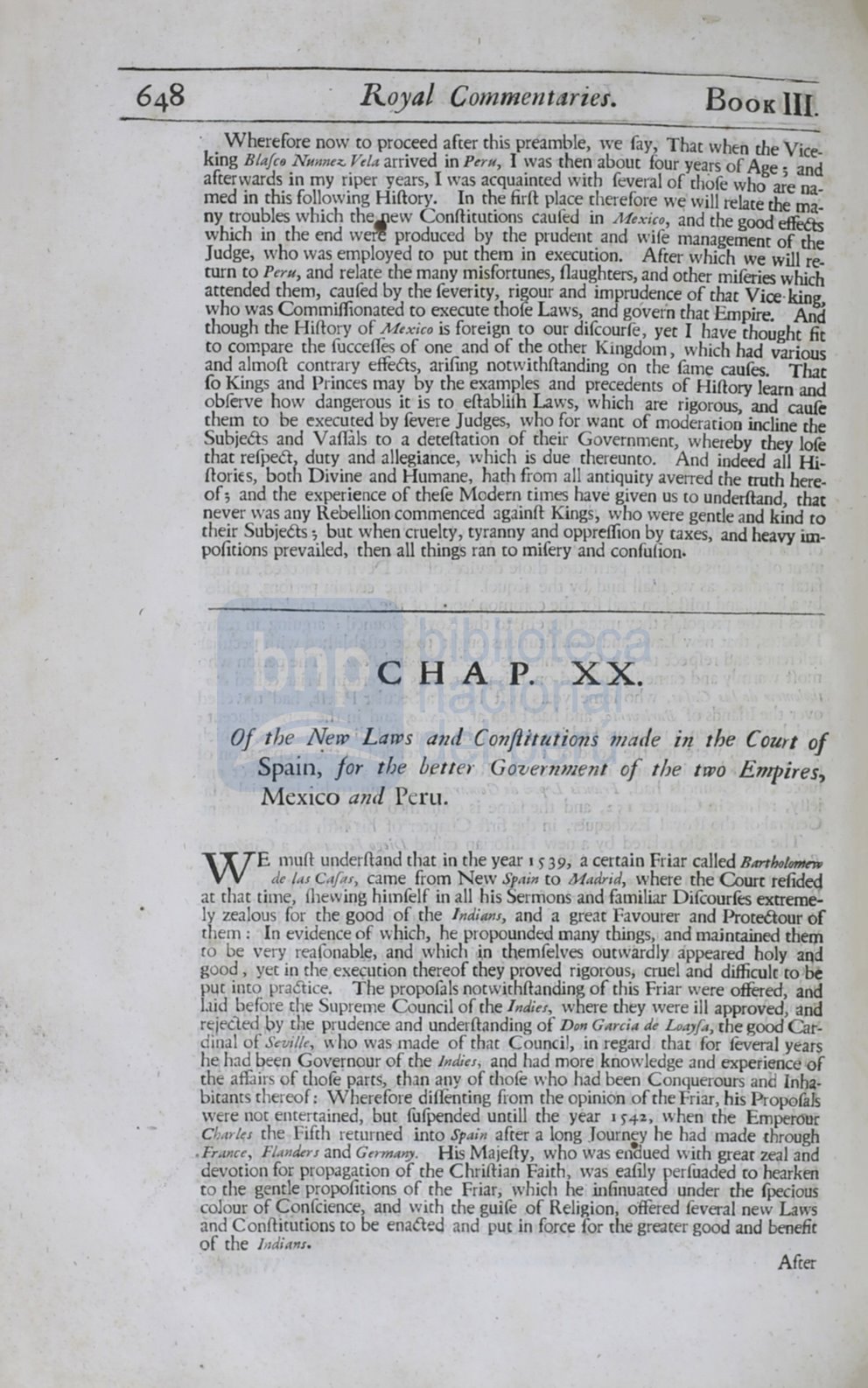

Royal Commentarie.r.
BooK
III.
Wherefore now
to
proceed after this preamble, we
fay,
That
when
the Vice–
king
Blafcs
Numze~
Vela
arrived
in
Peru,
I
was then about four years ofAge.
and
aftervyards.
in my
r}per
~ears,
I
was acquainted with feveral of rhofe
who a:e na–
med
m
this following H1fi:ory.
In
the
full:
place therefore we will relate
the
ma–
ny
troubles which die ew Confiitutions caufed
in
Mexico,
and
the
good
effects
which in the end
we!i
produced by
th~
prudent. and wife management of
the
Judge, who was employed
to
put them m executton. After which we
will
re–
turn
to
p~,,.u,
and relate the many misfortunes, flaughters, and other
miferies
which
attended them, caufed by the feverity, rigour and imprudence of that Vice-king,
who was Comrniffionated to execute thofe Laws, and govern chat
Empire.
Arid
though the Hill:ory of
Mexico
is
foreign to our difcourfe, yet
I
have thought
fit
to compare the fucceffes of one and of the other Kingdom, which had various
and almofi contrary effeets, arifing notwithfianding on the
fame caufes.
That
fo Kings and Princes may by the examples and precedents of Hifiory
learn and
obferve how dangerous it is
to
efiablilh Laws, which are rigorous, and caufe
them to be executed by fevere Judges, who for want of moderation incline the
Subjeets and Vaffals to
a
~eteftatio~
of_ their Government, whereby they
lofe
that refpeer, duty and allegiance, which is due thereunto. And indeed all
Hi–
fioric
s,
both Divine and Humane, hath from all antiquity averred the
nuch
here..
of; and the experience of thefe Modern
cimes
have given us to underftand
that
never was any Rebellion commenced againfi Kings, who were gentle and hlnd to
their Subjeets; but when cruelty, tyranny and oppreffion by taxes, and
heavy
im–
pofitions prevailed, then all things ran
to
mifery and confufion•
• J
C H A P. : XX.
Of the
~ew
Laws and Conftitutions made
in
the
Court of
Spain,
for
the
better Govern111ent
of
the two
Ernpires,
Mexico
and
P ru.
"l:T
TE
mufl: underftaod that in the year
1
5
39,
a certain Friar called
BartholllrM'W
VV
de la.r Cafau,
came from New
Spain
to
Madrid,
where the C.ourt
reftded
at that time, fhe
ing
himfelf
in
all his Sermons and
familiar
Difcourfes extreme–
ly
zealous for the good of the
Indians,
and a great Favourer and ProteCtour
of
them :
In
evidence
of
which, he propounde<d
many
things, and
maintained
them
to
be very reafonable, and which
~n
themfelves
outwardly appeared holy
and
good , yet in the execution thereof they proved rigorous, cruel and
difficult
to be
PU(
into practice. The propofals nocwithfianding of this Friar were offered, and
Llid before
the
Supreme Council of che
lndiu,
where they were
ill
approved, and
rejec1ed
by
the
prudence and underfiandiog of
Don
G11rcia
de
Loayfa,
the good
Car–
dinal
of
Seville,
who was made of that Council, in regard
that for
feveral years
he had been Governour of the
JndiCJ,
and had more knowledge and experience of
the affair
f
thofe part ,
than
any of chafe who had been Conquerours an
Inha–
bitants
thereof: Wherefore di!Ienting from the opinion of rhe Friar, his Propofals
were not entertained, but fufpended untill the year
1542,
when the
Emper6ur
Char/e.r
the
ifch
returned into
Spain
after a long Journey he had made tfirough
France Flanders
and
Germany.
His
Majefiy, who was
en~ued
with
great zeal and
devotion
for
propagation of the Chriftian Faith, was eafily perfuaded
to
hearken
to
che gentle propoficions of the Friar, which he inGnuated under the fpecious
colour of Confcience, and with the guife of Religion, otfered feveral
new
Laws
and Confiitucions to
be
enaeted and put in
force
for the greater good and benefit
of
the
/JJdians.
· Afrer














